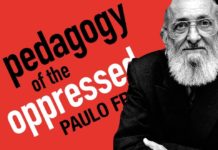Disclaimer: The Eqbal Ahmad Centre for Public Education (EACPE) encourages critical and independent thinking and believes in a free expression of one’s opinion. However, the views expressed in contributed articles are solely those of their respective authors and do not necessarily reflect the position or policy of the EACPE.
If we look back into history there is no evidence whatsoever that all these great men who shaped our world were the product of any sort of examination system. Plato, Aristotle, Copernicus and so on to name a few. There was no such system of exams at their times, at least not in the terms we observe in contemporary times, but still they laid down the foundations of modern knowledge, like politics, social sciences, physics, astronomy, and mathematics. Some of them never went to school and it is interesting as well as puzzling to me that someone without any formal training of a thought process and methodology could do so much at their times.
One ponders how they could do such brilliant things of their own without any proper guidance? The present system of research and academies came much later. The answer to their question was given by a Chemistry Nobel Laureate of 2016. He insists that research is a curiosity driven and mostly it is arbitrary. The Nobel Laureate chemist suggested that we should not hard work rather we should do smart work. Actually when we say we are doing hard work we mean we are not enjoying the work. Without personal interest and enjoyment, one cannot do creative things. So all the great people, like the ones mentioned in the very start of this article, had quest for knowledge and curiosity.
The system of examination was properly introduced in last century and it was primarily meant to judge mental capabilities of a person. However, I feel that we have followed a process of degradation in this system. In the beginning, exams were purpose oriented but they are now getting vague. Look at SAT exams, for instance. They are for admissions in American colleges but some Pakistani universities also use them just to impress public. This is a tough exam and it is not necessarily related to one’s interest. Like if someone wants to do research in biology, he will be tested in mathematics in SAT exam which is mandatory. Similarly, a mathematics student would be tested for complex English grammar.
People who scored well in these exams argue that universities want to test whether one is capable of communicating in English or not. On the contrary, I don’t think that this method can tell us much about one’s capability to communicate in English. I fear such exams do more harm than good. Recently, a story was published in Sheffield newspaper reporting how much American high school students who were on Easter leave were worried about their exam. Parents saw their sad son at beach. When asked why was he not enjoying, he replied ”SATs”. Not even SAT (Scholastic Assessment Test) but SATs! Now, someone who is so much worried about these things cannot really live a happy life. SAT takers have to take classes on weekends, they have to do extra practice sessions and solve past papers. After weeks or months of hard work in preparation, finally they are given 3 hours to prove their worth.
Exams can be taken as a necessary evil, something which perhaps has to be there. However, they multiply our problems when they are applied badly.
It shouldn’t surprise finding that a number of students suffer depression during exam. It shows helplessness, as well as hopelessness, and it makes sense considering how much a student works hard, but later his expectations are not fulfilled. Same is the case with our matric and intermediate students. Just consider the reality that after spending hours in school, a student has to visit tuition academy to study the same lesson again. Besides paying huge fees for academic institutions and tuition academies, quality learning is nonexistent, and students have to endure more and more stress. Instead of curiosity and understanding things, a student has to memorize his or her lessons like a hafiz and ultimately reproduce them in exams to earn good grades. Moreover, there is a culture of summer camps at matric and college level as well. In addition, usually our private schools begin their matric classes 3 months prior to regular session, and same is the case with intermediate. Students find no choice and in this way they are literally thrown in a continuous business of rote learning. As said by the chemistry Nobel Laureate, they are doing boring and hard work, so there is no probability of doing something creative.
Now, a question: what is the result of all this exercise? No doubt our board toppers happen to be brilliant students and they score really well in their exams. Looking at numbers, we should be among the top nations in the world but here we are left being questioned whether we are a failed state or failing state academically. Unfortunately, our addition to the world’s stock of knowledge and progress is difficult to trace.
Exams can be taken as a necessary evil, something which perhaps has to be there. However, they multiply our problems when they are applied badly. In my occasional encounters with my friends, when I invite them to brainstorm on certain ideas, they show less interest and argue that they need to concentrate only on what’s written in the course books, and secure grades, instead of thinking out of box and ultimately losing marks. After all, during exams one has to revolve around the books, and any new thought or idea would most likely be rejected.
This state of affairs is discouraging. I believe a student should be tested only in his relevant subject. For example: a mathematician should be tested in mathematics and a man from literature background should be tested in literature. Such sort of exams should not be there anymore which ruin the mental capability of students with irrelevant things. Our students deserve to have some free time to relax and do extracurricular things, as then their minds will be fresh enough to ponder on new things. This, in no sense, is a proposal to the eradicate system of exams. Instead, the point is to employ this competency test rationally and correctly. More focus should be on the mental growth of students, instead of encouraging memorizing things. Otherwise, in present, academy machines and hafizs of science cannot become leaders in the world of science because rote learning can never help you do creative things.
So, the moral is to be free, to be happy and to enjoy your education, instead of unproductive rote learning. For your success, I think you should follow the advice of American Nobel Laureate, Frank Wilczek: ”Learn, think, understand, enjoy and repeat.”
About the Author:
The writer is doing F.Sc (Pre-Engineering). He has a deep enthusiasm for physics and mathematics. He is also a member of Science Talent Farming Scheme (STFS) of Pakistan science foundation (PSF).







